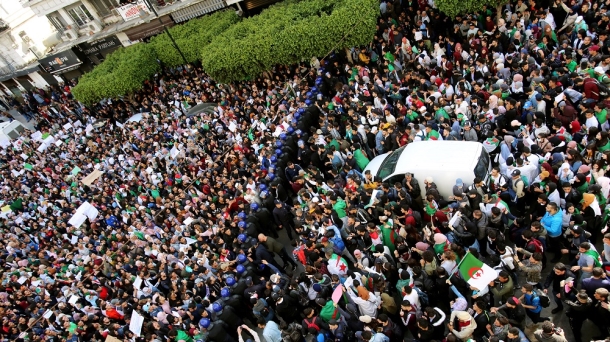
Popular protests in Algeria have gained momentum in past weeks, growing into the largest mass movement since independence. Set off by opposition to a fifth term for the ailing, aged President Abdelaziz Bouteflika, the protests reflect widespread dissatisfaction with the status quo—with rampant corruption, rule by a narrow elite connected to Bouteflika, and the injustices faced by Algerians. The demand that Bouteflika step aside is simply shorthand for a laundry list of demands to address these grievances.
That these demands are widely shared by Algerians is evidenced by the magnitude and diversity of the protests, which have swept up most major cities and drawn millions of people across ideological, social, demographic and geographic lines.
As a result of the sustained protests, cracks have appeared in the Algerian regime. The national war veterans’ organisation (ONM)—a key support for Bouteflika and the regime’s revolutionary legitimacy—has thrown its support behind the protests. Icons of the Algerian revolution like Djamila Bouhired have also joined in, along with a number of professional syndicates. And the Party of the National Liberation Front (PFLN), a core part of the state political structure, has withdrawn from the ruling coalition.
In response to the protests, President Bouteflika has declared that he will not seek a fifth term. Instead he proposed a national conference that will culminate in the drafting of a new constitution and the establishment of a ‘Second Republic,’ followed by presidential elections. While this development seems to be a concession to the protest movement’s demand, it paradoxically strengthens Bouteflika’s position, allowing him to stay in office indefinitely after the conclusion of his fourth term on 18 April 2019 and oversee the selection of his successor.
Whether Bouteflika’s proposal is enough to appease the popular movement is still an open question. While it meets protestors’ first demand, it nevertheless leaves Bouteflika in office without a constitutional mandate. In addition, the president’s previous promises of thoroughgoing reforms, announced in 2011 during the Arab Spring, were not carried through, which may make his current promises less credible. Moreover, following Bouteflika’s announcement, France abandoned its wait-and-see attitude, lining up behind the Algerian president and his proposal. This will not necessarily work to his benefit, as Algerians see their former coloniser supporting Boutflika’s continuation as president without an election and in violation of the constitution.
In light of these considerations, several courses of action present themselves to the regime. The first is containment, which is the tack currently being pursued by the authorities. By recognising the legitimacy of the protestors’ demands, praising their peaceful conduct, and offering piecemeal concessions, the regime hopes to defuse the protests or perhaps buy time to divide the movement by fuelling discord or offering positions to some of its leaders. But this scenario cannot continue indefinitely, since it relies fundamentally on encouraging the movement, thus raising its expectations, only to frustrate them with empty promises and double-edged concessions.
A second course of action is to initiate far-reaching reforms. This may require side-lining Bouteflika or limiting his prerogatives, which is not unlikely given that the president has already accepted renouncing power in principle. Mounting a defence of him for another year or two may not be feasible, especially if the cost is endangering the regime as a whole.
A final possible scenario is a crackdown. If the regime remains on the back foot while the popular movement continues to gain in force, it could alarm factions within the regime enough to turn to the security option. This scenario is the least likely, however, considering the rifts already visible in the ranks of the regime. Western powers like France and the US would also act to prevent a full-scale confrontation, fearing the consequences could extend north to Europe and south to the Sahel.
*This is a summary of a policy brief originally written in Arabic, available here:
http://studies.aljazeera.net/ar/positionestimate/2019/03/190314122046360.html